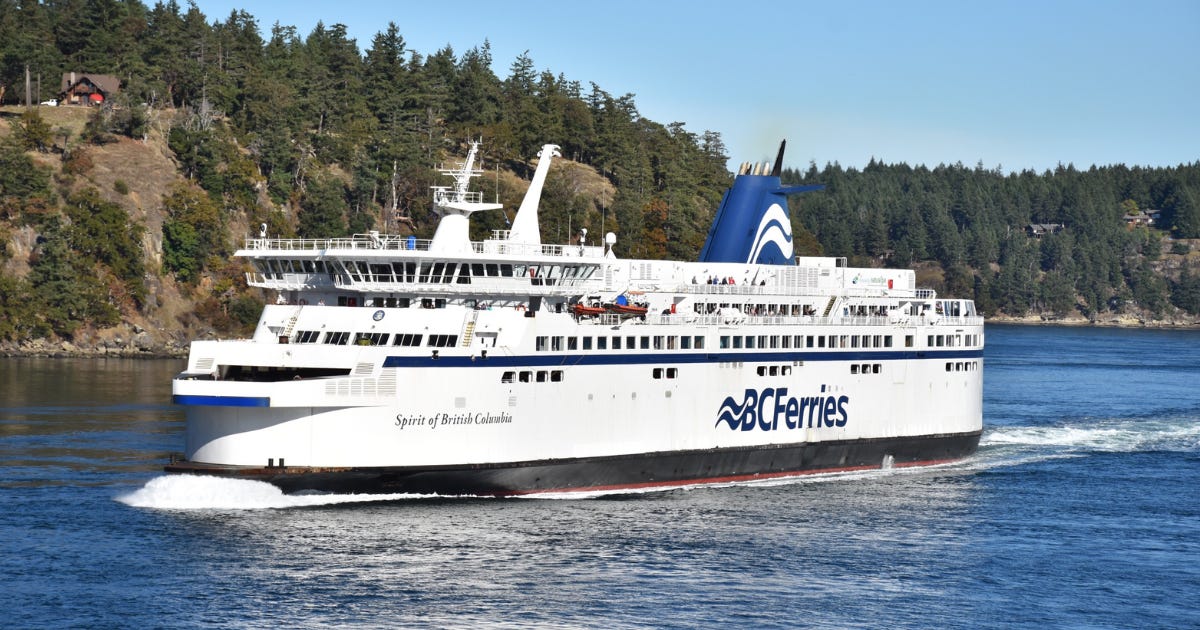“Highly offensive”: BC shipbuilders decry China ferry contract
BC Ferries is facing a wave of criticism from industry leaders after awarding a contract to a Chinese shipyard, with many arguing the decision highlights a lack of “political will”.
BC Ferries is facing a wave of criticism from industry leaders after awarding a contract to a Chinese shipyard, with many arguing the decision highlights a lack of “political will” rather than a shortage of domestic capacity.
Public outrage has been expressed since the news first emerged regarding BC Ferries’ selection of the PRC-backed China Merchants Industry Weihai Shipyards.
Matters were made worse when it came to light that the financing to construct the four new vessels would come from taxpayers in the form of a $1 billion low-interest loan from the Canada Infrastructure Bank.
Leaders in the steel and shipbuilding industry testified during a Standing Committee on Transport, Infrastructure and Communities meeting on Thursday, calling the contract “highly offensive,” “frustrating” and “with no regard for the long-term benefits.”
“Our shipyards were set up to fail even before they had a chance,” said United Steelworkers National Director for United Steelworkers Marty Warren.
Conservative MP Leslyn Lewis highlighted how many union members pay taxes that go to the CIB’s billion-dollar fund, asking Warren about its effect on the industry.
“When we just race to the bottom for the cheapest labour we really do lose the taxpayers base. A lot of these jobs are good jobs, raise a family, perhaps own a home, retire and dignity. When that work is not provided to Canadians, we lose the tax base for hospitals, education and infrastructure,” said Warren.
“The Chinese now cover 65 per cent of maritime production compared to only five per cent 10 years ago. How do you react to that to see that we’re a bit of an accomplice in the fact that China is taking over nearly the entire global market for ship production.”
Warren called for a “clear and enforceable buy Canada, buy clean policy.”
“Public dollars must support Canadians jobs and communities,” he said. “Every major infrastructure project financed by taxpayers should require Canadian content with binding commitments for Canadian-made products and labour.”
Lewis questioned whether BC Ferries and the CIB could have structured the loan procurement rules to require Canadian steel content and jobs, thereby supporting domestic industries instead of aiding foreign competitors.
“The only thing that the lack of bids proves is that the process was stacked against domestic yards. I think it’s time for our government to invest in our workers because no yard in Canada is going to scale up if work keeps going overseas,” responded B.C. Ferry & Marine Workers’ Union President Eric McNeely.
McNeely added that if shipbuilding isn’t done domestically, the Canadian steel industry will diminish, ultimately resulting in Canada losing its sovereignty.
Brynne Bourke, executive director of the BC Building Trades, testified before the committee, addressing the generational job losses.
“An economic study was conducted when BC Ferries was contemplating building seven vessels and it found that BC’s major vessel project would have created between 2,500 and over 5,000 jobs in our shipyards and another 1,000 to 2,000 indirect jobs from suppliers in British Columbia,” said Bourke.
“This decision does not reflect our values as Canadians. It does not recognize the longstanding role workers have played in building our shipbuilding industry. It does not enable skilled trades building and apprenticeship opportunities for our youth. It does promote economic activity on our coast or help circulate wages within our local communities and it does nothing to bolster our national security.”
All witnesses testifying before the committee argued that the premise that domestic shipyards were incapable of constructing the vessels was false. Bourke pointed out how the Chinese government subsidizes its domestic shipping yards for both military and commercial purposes to maintain its burgeoning economy, and called on Canada to do the same.
She also noted that the HMCS Protector was built domestically and remains the longest-operating naval vessel in Canadian history.
“We’re building very substantive projects in British Columbia, the idea that we couldn’t build this tomorrow is highly offensive to my members who are doing much more sophisticated things in the shipyards,” said Bourke.
“We stand ready to provide a local workforce to build these ferries in British Columbia.”




Thank you Dr Lewis for bringing this matter to Parliament. It’s unbelievable that we would not only take valuable work & production materials from Canadians but then support the Chinese with a loan to help them do it!
We have cancelled contracts to buy military planes from the USA before. Why can't we cancel this contract? Yes, there could be a penalty but in the long run, awarding the contracts to Canadian companies would pay off.
But to do that we'd need political will and considering how compromised we are by China...
But, it is still outrageous! Do you think if we had a leader like Donald Trump this deal would go through? Maybe we should start questioning everything with 'What would Donald do?' b/c he is acting to put his country first. In Canada, we have a climate zealot who wants us aligned to the EU and subjugated to the rule of the UN.